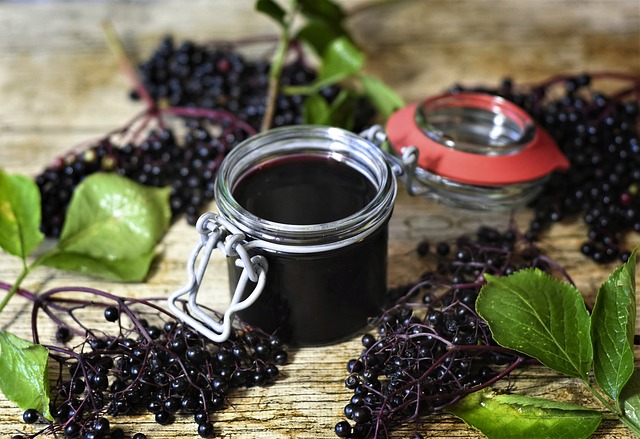As we head deeper into cold, flu, and COVID season, people may be tempted to turn to anything that will prevent, cure, or reduce symptoms of their condition. Sales for all sorts of supplements are up, including elderberry syrup.
Elderberry syrup, made from the dark purple fruit of the elderberry bush, has been touted for centuries to be effective in reducing symptoms of the common cold and flu.
More recent research suggests it may also offer pain relief and be of some use to individuals with metabolic conditions including obesity and diabetes. Like other dark berries, such as blueberries and blackberries, elderberries are high in the antioxidant anthocyanin.
The type of elderberry used most often in supplements comes from the European elder known as black elderberry or Sambucas nigra. Supplemental forms of elderberry are available, including gummies, lozenges, syrups, and teas.
Health Benefits
Elderberries may have health benefits related to the antioxidant anthocyanin. Antioxidants work to reduce cellular damage from free radicals produced in the body due to metabolism, pollution, smoking, and other chemical reactions that occur in the body. Anthocyanin also has an antiviral ability that could prevent or limit the symptoms of some common infections.
Colds and Flu
Colds and flu are both caused by a virus, so antibiotics won’t touch them, but may alter the gut microbiome. Elderberry syrup has been utilized as a homeopathic remedy to reduce the duration and severity of symptoms of illness when used within the first two days that symptoms appear. A few small studies support this claim.
A 2022 analysis of studies indicates that elderberry may modulate inflammatory cytokines and aid in the initial prevention and treatment of viral diseases, including flu and COVID. Concerns for elderberry overstimulating the immune system have not been proven.
A 2019 meta-analysis of 180 subjects with cold and flu found that black elderberry syrup significantly reduced upper respiratory symptoms. The authors note this is likely a safer alternative than antibiotics or other medications that get prescribed for viral infections.
Pain Relief
The anti-inflammatory effects of anthocyanins may be responsible for elderberry being used for pain reduction. The antioxidants in elderberries prevent the production of a chemical called nitric oxide by the body’s immune system. Nitric oxide acts by signaling the body’s immune cells to produce compounds that cause inflammation in response to disease or injury. Pain and swelling are reduced when this response is prevented.
A small 2016 study found that topical elderberry may be beneficial in those suffering from knee osteoarthritis when compared to a common topical analgesic. The authors suggest longer-term and larger studies are needed.
Constipation
Tea prepared with dried elderberry may also be beneficial in relieving constipation. A compound called anthraquinone is also present in rhubarb and senna. This compound exerts a laxative effect by increasing intestinal pressure and promoting gut peristalsis to promote laxation.
In addition, a small study using elderberry along with other phytotherapeutic compounds in tea has found it to be an effective laxative in those dealing with chronic constipation. While elderberry tea appears safe, pregnant or lactating women are advised not to use herbal preparations until more research is available.
Diabetes
As the rate of diabetes is on the rise, safe methods to prevent or treat it are often sought after. A 2017 Norwegian study suggests that the use of elderberries enhanced the uptake of fatty acids and glucose in skeletal muscle tissue. Anthocyanins in elderberries act as strong antioxidants in skeletal muscle and have antidiabetic properties.
Another study suggests elderberries and other Nordic berries enhance the uptake of glucose in human liver cells. The authors believe the phenolic compounds of the berries assisted in glucose control (10).
Obesity
Like diabetes, obesity has certainly reached epidemic proportions in the US. In addition to limited physical activity and consumption of excess calories, oxidative stress and chronic inflammation may play a role in the development of obesity.
A 2019 study using elderberry extract suggested it may impact various hormones such as leptin and adiponectin. In addition, in vitro studies indicate that elderberry extract may impact digestive enzymes by inhibiting them. This will reduce the absorption of dietary lipids (fats) and carbohydrates.
A 2017 study published in Nutrients reviews the therapeutic value of elderberries in treating obesity. The biological activity of anthocyanins found in elderberry and other fruits containing this antioxidant may show promise in the treatment of obesity by reducing inflammation.
Final thoughts
Elderberry syrup and extracts show promise in reducing symptoms of cold and flu, reducing pain, and potentially preventing diabetes and obesity. However, individuals taking medications that suppress the immune system should avoid elderberry as it may interact with medications.
People with chronic conditions including cancer, liver or kidney disease, lupus, MS, rheumatoid arthritis, and other diseases should consult with their doctor prior to trialing these supplements. Elderberry extract and syrup, like all dietary supplements, are not approved by the FDA. Consumers should use their best judgment and discuss supplements with a pharmacist or their MD before trying them.
By Lisa Andrews, MEd, RD, LD
Copyright foodandhealth.com, reprinted with permission.

